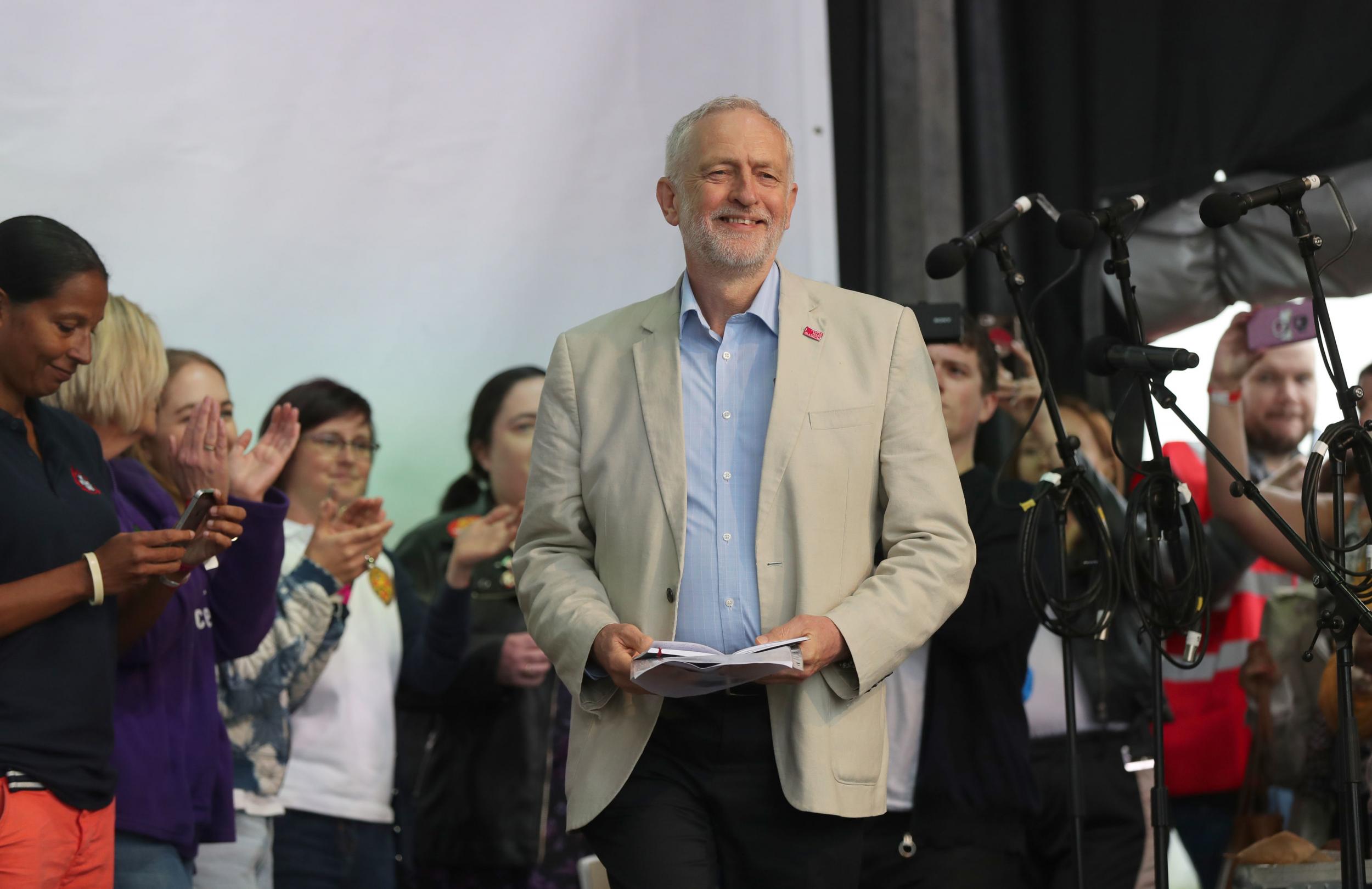Theresa May and Jeremy Corbyn have similar problems in their parties – and it's starting to damage our democracy
MPs in both Labour and Conservative parties have told me they fear putting their heads above the parapet in this climate because of the way politics is currently being conducted. The British public deserves better than this


This time last year, three Labour Party members were expelled for having agreed a “progressive alliance” to unseat the Conservative health secretary, Jeremy Hunt, at the general election in the constituency of South West Surrey. They had been involved in trying to implement a local agreement whereby the local Labour Party, Green Party and Liberal Democrats stood to one side and backed a single candidate – a local GP – to run against Hunt under the colours of the National Health Action Party. One of those expelled had been a member of 50 years standing; another was the constituency Labour Party secretary.
The rationale for this progressive alliance was that there was a far better chance of unseating the health secretary – who had a majority of more than 28,000 – if all the forces of social justice united behind one candidate rather than being split between other parties. Given the immense damage Hunt has caused to the NHS, this seemed eminently sensible.
Last week a number of my parliamentary colleagues, including Jon Cruddas, Clive Lewis and Ruth Lister, wrote an open letter to the party calling for the three members to be reinstated and for progressive alliance arrangements of this sort to be allowed to stop the Tories.
I am instinctively a pluralist and not overly tribal in my politics so have some sympathy for the case being made. I have always obeyed the rules of my party on this – and I always back Labour candidates – but I have a genuinely open mind about whether the rules should be changed to allow for this, because of our anachronistic, outdated and undemocratic national voting system that forces tactical manoeuvres of this kind.
In the Southeast where Hunt’s constituency is situated, the Tories win seats out of proportion to their vote share and Labour suffers because of our first-past-the-post system. Likewise in the Northeast, the opposite is true. The system in affect creates false electoral deserts where whole regions of the country are dominated by one party despite their opponents recording substantial numbers of votes. The whole unfairness of the system and lack of political diversity is what leads to these calls for tactical alliances of the progressive kind in certain regions.
This sorry state of affairs is one of many reasons why I have always been a passionate advocate of changing the rotten voting system we have to a system of proportional representation. It is the system we use to elect members of the Scottish parliament, Welsh assembly and the London assembly – where they have constituency members and top up members to ensure a more representative body – so it should be good enough for the UK parliament too.
However, unless a government is elected that will change the system, we have to suffer under FPTP, which necessitates each of the main parties acting as a coalition of the views of a broad range of voters on each side of the political spectrum.
The official Labour reaction to any call for a progressive alliance is that there is already one – the Labour Party. But, for FPTP to work and for enough people to reconcile themselves to it without an open revolt against it, both parties must be broad churches – in other words, an alliance of the views across most of their part of the spectrum, be it left or right. Needless to say, the current climate suggests that this is becoming less and less likely – in both Labour and Conservative parties.
Many Conservative MPs tell me that, with the decimation of Ukip, many of their most right-wing and reactionary members, who deserted the party once David Cameron became leader in 2005, are now returning. More and more former Ukip members who were never Tory members in the first place are now joining up too, attracted by the “hostile environment” rhetoric of Theresa May towards immigrants and the extreme Brexit agenda of that party being driven by the likes of Jacob Rees-Mogg.
Many Tory MPs who have not gone public – and followed the example of the 11 MPs who supported former attorney general Dominic Grieve’s amendment to the EU Withdrawal Bill, forcing May to give parliament a meaningful vote on the Brexit deal – are privately opposed to a hard Brexit (or Brexit altogether) but are simply too terrified of their local Conservative associations to say so.
Incidentally, the overwhelming majority of Tory MPs I speak to believe the hard-right Rees-Mogg would win the next Tory leadership election if the Tory parliamentary party put him on the ballot paper.
On the Labour side, internal debate on any policy issue is too often not judged according to its merits but the degree to which the advocate of the argument is an admirer of Jeremy Corbyn. Indeed, several of the new joiners to my local party since 2015 have specifically told me they joined to support the leader rather than the party generally.
It is true that many members of the Parliamentary Labour Party did not support the leader in the leadership elections of 2015 and 2016. This was because of his past and current policy positions on a range of issues, not because of any antipathy to him personally (many colleagues had never actually met him before he took office).
One parliamentary colleague of Jewish descent (I won’t name him to spare him the inevitable trolling and abuse), whose family were murdered by the Nazis at the Treblinka concentration camp, explained his reservations about the leadership thus: it is because he is angry about antisemites and extremists that he opposed the leader from the outset, who he felt kept company with and shared one too many platforms with such people in the past. It was his experience, the issues and his principles that drove his disposition to the leader, and not the other way round.
We can see similar thinking in terms of the Labour MPs (including myself) who campaign against Brexit. It doesn’t matter how many times we talk about our own personal and political reasons for supporting our membership of the EU and campaigning for a people’s vote on the final deal. It’s assumed instead that everything we say about the party’s current and unsatisfactory stance on Brexit has little to do with those beliefs and instead boils down to a reluctance to “get behind” Jeremy Corbyn.
I left the shadow cabinet out of principle and by mutual agreement in 2015 because I did not agree with the well-known Eurosceptic views of the new leader. I was furious at the lacklustre contribution to the Remain campaign of the leadership in 2016, which was why I could not express confidence in it after. I am half-Irish, have a Danish brother-in-law, niece and nephew, a French aunt and Spanish family too – like so many of my constituents. I don’t give a damn about the leader in this context – this is about my family and the many families who I represent who are directly affected by all of this. A lot of my colleagues in the party agree with me, but they don’t put their heads above the parapet for fear of the consequences. How do I know that? Because they tell me so.
Standing up for what we believe – whether it is anti-racism or fighting against this ridiculous Brexit – has been met with demands for our deselection, not only by a mob of abusers online but by local party members offline in party meetings and by Len McCluskey, the general secretary of the biggest affiliate and donor to the party, the Unite trade union (of which I am a member).
Local councillors not deemed sufficiently left-wing or supportive of the agenda of the leader are already being deselected. Moves are afoot at the party conference in September – driven and fronted, as ever, by Momentum – to change the nature of the trigger ballot mechanism by which Labour MPs are reselected: this is mandatory reselection in all but name, to make it easier to drive out the centre-left, social democratic tradition from our party.
Surely members of any party should be free to express different views – as our leader did for three decades before he took office (often voting in the division lobbies with the Tories against the Labour Party) – without fear of retribution when we express a different view on policy. Why, then, is there now this climate of fear, intimidation and general unpleasantness that acts to muzzle debate? Increasingly, I hear similar reports from centre-right Tory MPs in respect of their own party.
A situation where the broad range of views within each of the main parties is stamped out is not sustainable. Surely the British people deserve better than that? The question is: will the two old parties of British politics do anything about this or will they presume, while the whole world around us is changing, that they can carry on as if it’s business as usual and allow true democracy to be systematically eroded?
A tribute to our Tessa
British politics lost one of its greats on Saturday when Baroness Tessa Jowell of Brixton passed away. Tessa was my political mum – even my actual mother referred to her in this way. She stepped down as MP in the constituency that is next to mine in 2015 and we worked closely together on so many issues touching the borough of Lambeth and on more besides.
Like so many, she mentored me and provided me with advice and support as I made my way through the jungle that is politics. People often unfairly accuse all politicians of being in politics for themselves, but Tessa was precisely the opposite. Nationally she was best known for bringing the Olympics to London in 2012 and setting up Sure Start children’s centres as a minister in the last Labour government; locally she was loved for her work and I never heard a bad word said about her.
It was typical that she should use her experience of cancer to campaign for others needing groundbreaking treatments in the months before her death. Above all, Tessa was one of the most generous and emotionally literate people I have ever met – she could connect with people on a higher level. Few have the impact she has had, which is seen in the coverage.
Tessa was never happier than when talking about her family – particularly her children Jess and Matt – whom she was so proud of. Our country won’t be the same without her, but it is a much better place thanks to our dear Tessa.
Chuka Umunna is Labour MP for Streatham

Join our commenting forum
Join thought-provoking conversations, follow other Independent readers and see their replies